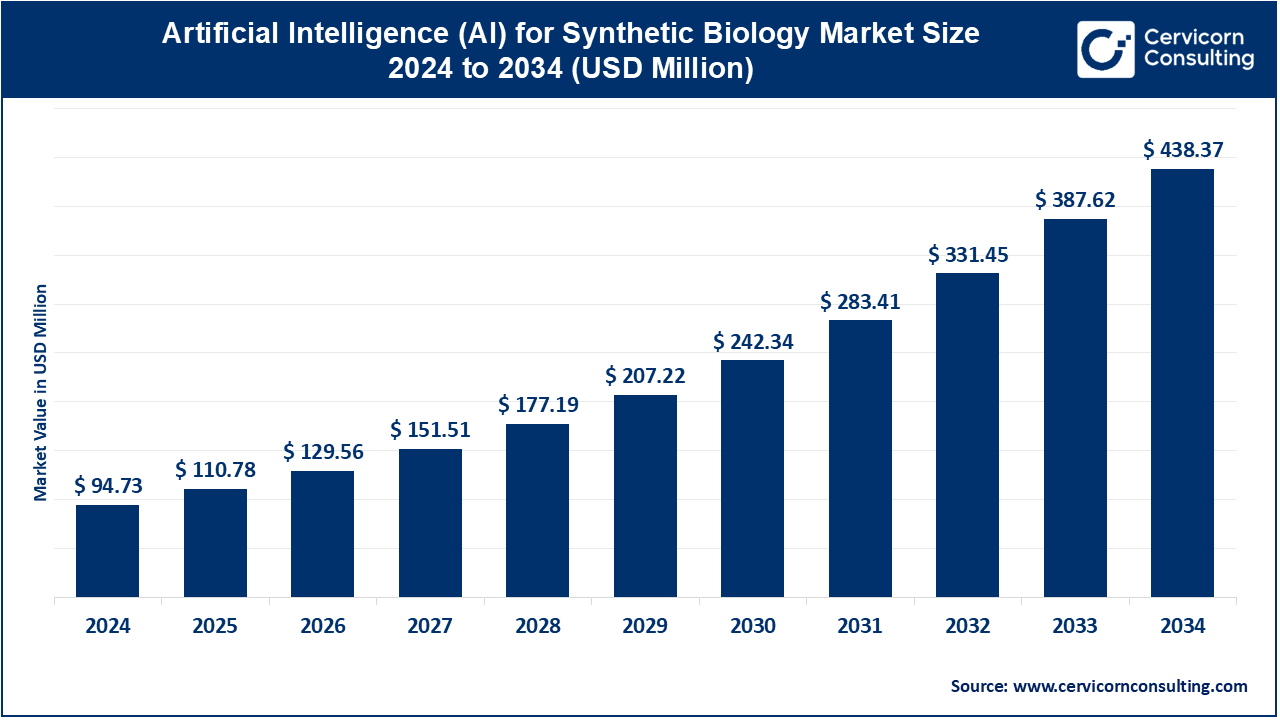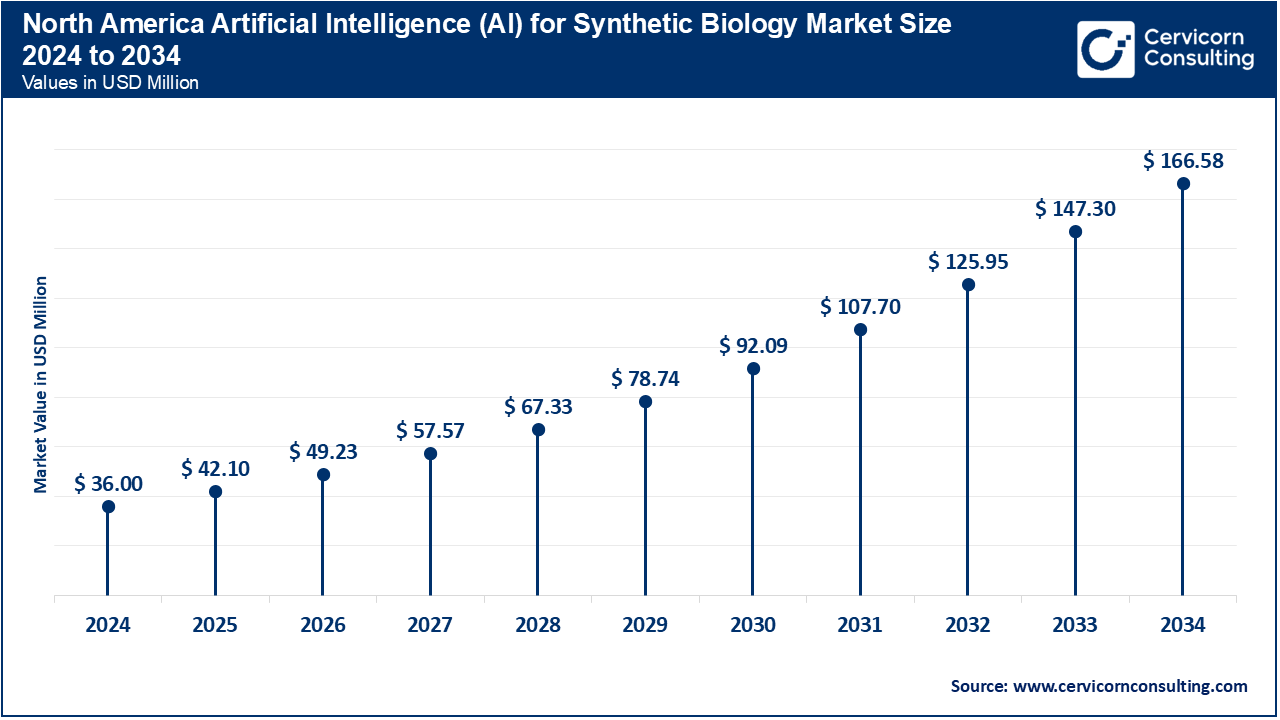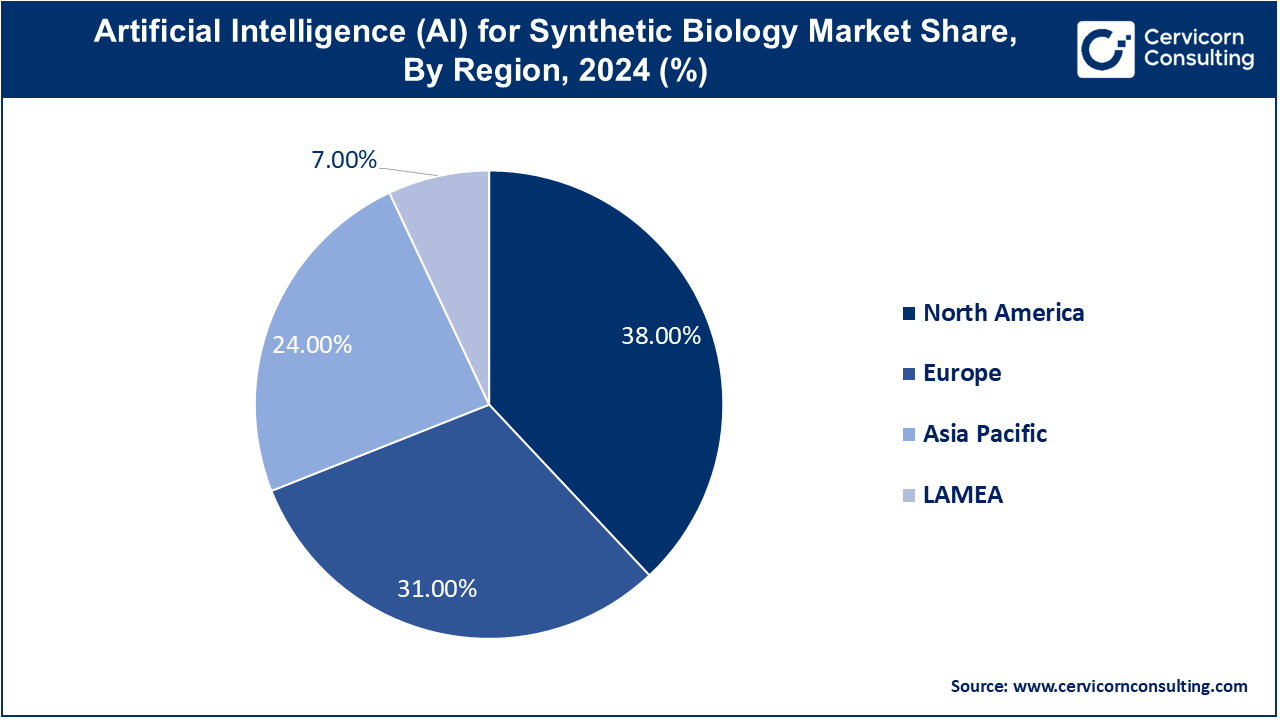The global artificial intelligence (AI) in synthetic biology market size was valued at USD 94.73 million in 2024 and is anticipated to reach around USD 438.37 million by 2034, growing at a CAGR of 16.56% from 2025 to 2034.
The market for artificial intelligence (AI) in synthetic biology is expanding rapidly, driven by the increasing integration of AI technologies in various sectors like pharmaceuticals, agriculture, and environmental management. AI enables researchers to automate the design of genetic sequences, analyze complex biological data, and optimize biological processes, which results in faster innovation cycles and reduced costs. The ability of AI to predict the effects of genetic modifications and streamline the development of bio-based products has attracted significant attention from both public and private sectors. Companies in the biotechnology space are leveraging AI to improve drug discovery, gene editing, and bio-manufacturing, opening up new opportunities for precision medicine, sustainable agriculture, and eco-friendly industrial processes. In 2024, venture capital investments for start-ups totalled $314 billion, with nearly a third directed toward AI-related fields, marking an 80% year-over-year increase in AI investments. The growing demand for AI-driven synthetic biology is also reflected in the rising number of collaborations between AI companies and biotech firms.

The artificial intelligence (AI) in synthetic biology market relates to applying AI in enhancing efficiency in designing, engineering and optimizing biology systems. This market is for application of AI in gene editing, metabolic engineering, drug discovery and development of synthetic creatures. AI in synthetic biology market is growing at fast pace as AI becomes an indispensable component in the synthetic biology. The appreciation of AI in analyzing large sets of data, identifying patterns and predicting results augments the capabilities in designing genetic circuits, metabolic routes and improving biological productivity which are very much complex and time taking when addressed in conventional means. In synthetic biology, AI is being used to put together unique applications in the betterment of human health, clean energy and environmental remediation. The expansion of the synthetic biology market is inevitable as it has been identified as a vital factor in enhancing the efficiency and advancement of biological products through the integration of artificial Intelligence technology that is vital in the creation of more sophisticated bio-products that are tailored to suit industries across the globe.
Report Scope
| Area of Focus | Details |
| Markeyt Size (2025) | USD 110.78 Million |
| Projected Market Size (2034) | USD 438.37 Million |
| Growth Rate (2025 to 2034) | 16.56% |
| Largest Revenue Share By Region (2024) | North America |
| Report Segments | Application, Technology, Deployment Mode, Regions |
| Top Companies | IBM Corporation, Microsoft Corporation, Google DeepMind, Benevolent AI, Insilico Medicine, Zymergen, Ginkgo Bioworks, Synthace, Recursion Pharmaceuticals, Berkeley Lights, Twist Bioscience, Atomwise, XtalPi, AbCellera, Arzeda |
The AI in synthetic biology market is segmented by region, including North America, Europe, Asia-Pacific, and LAMEA. Below is a detailed overview of each region:
North America is rapidly advancing, driven by significant investments in biotechnology and AI research. The United States and Canada lead in the development of AI-driven tools for gene editing, drug discovery, and metabolic engineering. This region benefits from strong government support, a robust biotech ecosystem, and collaborations between academic institutions and industry players. Efforts in North America are focused on leveraging AI to accelerate innovation in synthetic biology, particularly in the areas of personalized medicine and bio-manufacturing.

Europe is a key player with strong emphasis on ethical research practices and regulatory compliance. Countries like Germany, France, and the UK are at the forefront of integrating AI technologies into synthetic biology, particularly in areas such as genomic analysis, protein engineering, and synthetic genomics. The European market is characterized by substantial public and private investments, as well as strategic partnerships aimed at advancing AI applications in synthetic biology. The region's commitment to sustainability and innovation drives the development of AI tools that support environmentally friendly and socially responsible biotech solutions.
The Asia-Pacific region is experiencing rapid growth in the AI in synthetic biology market, fueled by extensive investments in AI technology and biotech infrastructure. China, Japan, and South Korea are leading in the adoption of AI for synthetic biology applications, including drug development, metabolic engineering, and bioinformatics. The region's focus on innovation and technological advancement is supported by government initiatives and increasing private sector involvement. Asia-Pacific's dynamic market environment fosters the development of AI-driven synthetic biology solutions that address both regional and global challenges, such as healthcare innovation and sustainable agriculture.

LAMEA region is emerging, with growing interest in adopting AI-driven biotech solutions to address unique regional challenges. In Latin America, countries like Brazil and Argentina are exploring AI applications in synthetic biology to enhance agricultural productivity and develop bio-based industries. The Middle East is investing in AI technologies to diversify its economy and enhance healthcare innovation, while Africa is beginning to embrace AI for genomic analysis and bio-manufacturing. Despite economic and infrastructure challenges, the LAMEA region holds significant potential for growth, driven by abundant natural resources and a rising focus on sustainable development and technological advancement.
Drug Discovery and Development: AI is revolutionizing drug discovery and development by identifying potential drug candidates, optimizing chemical compounds, and predicting therapeutic efficacy. Machine learning algorithms can analyse vast datasets of molecular structures and biological interactions, significantly reducing the time and cost required to bring new drugs to market. Subsegments include AI-driven molecular docking, compound screening, and predictive models for assessing drug toxicity and efficacy.
Genomic Analysis: In genomic analysis, AI plays a critical role in deciphering complex genetic data, identifying genetic variations, and pinpointing gene-editing targets. AI tools are used to detect patterns and correlations in large genomic datasets, aiding in the understanding of disease mechanisms and the identification of potential therapeutic targets. Subsegments include AI-assisted genome-wide association studies (GWAS), identification of single nucleotide polymorphisms (SNPs), and AI-enhanced CRISPR target site selection.
Metabolic Engineering: AI optimizes metabolic pathways in microorganisms to enhance the production of biofuels, chemicals, and pharmaceuticals. By modelling and simulating complex biochemical networks, AI helps in designing efficient metabolic circuits that maximize yield and reduce by-products. Subsegments include AI-driven pathway optimization, strain engineering for industrial biotechnology, and the prediction of metabolic flux distributions.
Protein Engineering: AI applications in protein engineering involve designing and optimizing proteins with specific functions or properties for industrial and therapeutic uses. AI can predict protein folding, engineer enzyme activity, and design novel proteins that perform specific tasks, such as catalysing reactions or binding to targets. Subsegments include AI-based protein structure prediction, enzyme engineering for biocatalysis, and therapeutic protein design.
Synthetic Genomics: AI is used in synthetic genomics to design and construct new genomes, enabling the creation of novel biological systems. This involves using AI to predict the functions of genes and regulatory elements, guiding the synthesis of entire genomes tailored for specific applications, such as bio-production or environmental remediation. Subsegments include AI-driven genome design, synthetic chromosome construction, and the development of minimal genomes for synthetic organisms.
Machine Learning: Machine learning is a cornerstone technology in synthetic biology, enabling systems to learn from data and improve their predictions and analyses over time. It is widely used across various applications, from predicting gene expression patterns to optimizing metabolic pathways and drug discovery processes. Subsegments include supervised learning for gene function prediction, unsupervised learning for clustering biological data, and reinforcement learning for optimizing experimental designs.
Natural Language Processing (NLP): NLP technologies facilitate the extraction and analysis of information from scientific literature and databases related to synthetic biology. AI-driven NLP can process vast amounts of text to identify relevant research findings, extract key insights, and support knowledge discovery. Subsegments include AI-based literature mining for gene-disease associations, automated extraction of experimental protocols, and sentiment analysis in scientific publications.
Computer Vision: Computer vision systems analyse and interpret visual data, playing a crucial role in high-throughput screening and phenotypic analysis of biological samples. AI-driven image analysis can identify cellular structures, monitor microbial growth, and detect morphological changes, enabling faster and more accurate biological assessments. Subsegments include AI-powered microscopy image analysis, automated phenotyping of genetically engineered organisms, and real-time monitoring of bioprocesses through video analysis.
Robotics and Automation: AI-driven robotic systems automate laboratory processes, including sample preparation, DNA synthesis, and high-throughput experimentation. Robotics combined with AI enhances the precision, speed, and scalability of synthetic biology research, allowing for more complex and reproducible experiments. Subsegments include AI-controlled liquid handling systems, automated colony picking and screening, and integration of AI with laboratory information management systems (LIMS).
Cloud-based Solutions: Cloud-based AI applications offer scalability and flexibility for synthetic biology research and development. These solutions allow researchers to access powerful computational resources, collaborate across different locations, and scale their operations without investing in extensive on-premises infrastructure. Subsegments include AI platforms for cloud-based genomic analysis, collaborative cloud environments for synthetic biology research, and cloud-hosted AI tools for drug discovery.
On-Premises Solutions: On-premises AI systems are deployed within an organization’s infrastructure, providing enhanced control and security over data and processes. These solutions are often preferred by institutions with sensitive data or those requiring high-performance computing resources directly within their facilities. Subsegments include AI-driven on-premises bioinformatics pipelines, in-house AI tools for metabolic engineering, and secure on-premises AI platforms for pharmaceutical development.
The AI in synthetic biology market is characterized by a dynamic mix of key players, including leading biotechnology firms, pharmaceutical companies, and technology giants. Companies like Ginkgo Bioworks, Inscripta, and Zymergen are at the forefront, leveraging AI to advance synthetic biology applications such as gene editing, metabolic engineering, and protein design. Major pharmaceutical companies like Pfizer and Novartis are increasingly adopting AI-driven synthetic biology for drug discovery and development. Meanwhile, technology leaders such as IBM and Google are providing AI platforms and computational tools that enable breakthroughs in genomic analysis and bioinformatics. The collaborative efforts between these diverse players are driving innovation, accelerating research, and pushing the boundaries of what is possible in synthetic biology.
CEO Statements
Here are some recent CEO statements from market players in the AI in synthetic biology market:
Jason Kelly, CEO of Ginkgo Bioworks
"Jason Kelly emphasized the transformative potential of AI in synthetic biology, particularly through Ginkgo's partnership with Google Cloud. He stated that the collaboration is set to "reshape humanity's understanding of biology" by applying AI to genomics, protein studies, and other areas critical to biotech. This partnership aims to develop advanced AI models that will enhance drug discovery and biosecurity efforts, leveraging the power of AI to push the boundaries of what’s possible in synthetic biology."
Miriam Fernández, S&P Global
"In a recent report, Fernández highlighted how AI is central to the rapid advancements in synthetic biology. She pointed out that the integration of AI with engineering and biological sciences is creating new opportunities across various industries, including healthcare, agriculture, and renewable energy. She also touched on the ethical considerations that come with these advancements, noting that while AI enables unprecedented innovation, it also necessitates careful risk management to avoid unintended consequences."
These statements reflect the commitment of key industry players to advancing AI in synthetic biology technologies and supporting the global transition to sustainable energy solutions.
Strategic partnerships and Launches highlight the rapid advancements and collaborative efforts in the AI for synthetic biology market. Industry players are involved in various aspects of AI for synthetic biology, including production, storage technologies, and fuel cells, and play a significant role in advancing the market. Some notable examples of key developments in the market include:
Market Segmentation
By Application
By Technology
By Deployment Mode
By Region